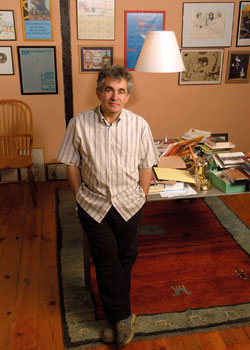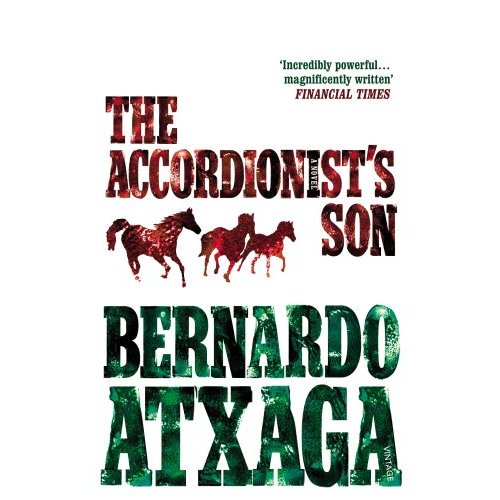La obra, cuya primera edición, en euskera, corrió a cargo de Pamiela, ha sido reconocida por el “Times”
La novela El hijo del acordeonista, del escritor vasco Bernardo Atxaga, acaba de ganar el premio a la mejor traducción del Times Literary Supplement, una distinción que se suma a otros galardones conseguidos por esta obra en el extranjero, como el Mondello y el Grinzane Cavour, ambos de 2008.
Según informó ayer la editorial Alfaguara, responsable de la edición en castellano, el diario The Times acaba de hacer públicos los premios que el citado suplemento literario otorga cada año a las mejores traducciones a lengua inglesa y, entre los ganadores de 2009, figura Margaret Jull Costa, por su versión de El hijo del acordenista, publicada en el Reino Unido bajo el título The Accordionist”s Son.
Esta obra, cuya primera edición, en euskera, corrió a cargo de la editorial pamplonesa Pamiela, es una de las más personales de Atxaga y obtuvo el Premio de la Crítica en lengua vasca concedido por la Asociación Española de Críticos Literarios. Asimismo, su traducción al castellano, realizada por el propio Atxaga y por su mujer, Asun Garikano, fue seleccionada para el Premio Nacional de Narrativa de 2004, un galardón que el escritor ya había ganado en 1989 con Obabakoak. En El hijo del acordeonista, Bernardo Atxaga regresa a Obaba, ese territorio imaginario en el que el escritor ha situado varias de sus novelas y que le ha servido para reflejar el presente y el pasado del País Vasco.
Ese retorno tiene “sabor a despedida, ya que en esta ocasión Atxaga vuelve para no regresar jamás, para narrar la desintegración del mundo de Obaba y para que en esta novela confluyan todos los rasgos principales de su estilo”, se afirma en la nota de Alfaguara.
traducciones Por otro lado, Atxaga también ha sido noticia esta semana porque ha llegado al público extranjero en los últimos meses con las nuevas ediciones de siete de sus obras en países como Francia, Portugal, Croacia o Corea del Sur.
Paseando por géneros como la novela, el ensayo, la poesía, la literatura infantil, el teatro y los relatos juveniles, el autor verá, por ejemplo, su novela Siete casas en Francia publicada en inglés (primavera de 2011), francés (otoño de 2010) y portugués (el pasado otoño). Será su noveno título en Francia, tras las traducciones de Obabakoak, El hombre solo, Dos hermanos, El hijo del acordeonista, Esos cielos y Memorias de una vaca, entre otros. En Reino Unido, por su parte, ya ha publicado seis libros, mientras que Bulgaria acaba de editar El hijo del acordeonista. Durante los próximos meses también verán la luz cuatro nuevas ediciones de la obra Obabakoak: en rumano, ruso, coreano e inglés (en la que tendrá una nueva versión con tapa dura en Estados Unidos). Con estas nuevas traducciones, Obabakoak se podrá leer en 27 lenguas diferentes.
Publicado por Noticias de Navarra
http://www.diariovasco.com/20100116/cultura/premian-version-inglesa-hijo-20100116.html
Book Review
Bernardo Atxaga’s “The Accordionist’s Son”
By Jascha Hoffman
 The Accordionist’s Son By Bernardo Atxaga. Translated by Margaret Jull Costa. 370 pages. Graywolf Press, $25; Vintage, £8.99.
The Accordionist’s Son By Bernardo Atxaga. Translated by Margaret Jull Costa. 370 pages. Graywolf Press, $25; Vintage, £8.99.
The Basque novelist Bernardo Atxaga has spent his career moving between fairy tales and terrorism. His early works were set in the mythical Spanish town of Obaba, where birds, squirrels and snakes could speak. Later he turned out gritty novels about men and women backed into corners by their entanglement with the Basque separatist movement. These two worlds converge in “The Accordionist’s Son,” a sprawling novel about the legacy of civil war in Spain that borrows characters from Atxaga’s previous works but does not have quite the same charm and power.
Stretching across most of the 20th century, the novel is framed as the memoir of David Imaz, a Basque exile. Dying on a ranch in Northern California in 1999, he steals away from his American family each night to document his early life in his native language. We learn he was raised in the peaceful town of Obaba, not far from Guernica, with only a dim awareness of the civil war that ended a decade before he was born. As a teenager he discovers a list of Republican sympathizers executed on behalf of the Franco regime in 1937. It is in his father’s hand.
Rather than confront his father, David turns his conscience against himself. He is sickened by the thought of colluding with a corrupt regime, so he refuses to play the family accordion at the unveiling of a monument to Franco’s soldiers, disappearing instead to a cellar that once hid Republicans during the civil war. But one cannot hide from history, especially when it is set to repeat itself. By the late 1960s the Basque separatist movement is brewing, and David comes under suspicion by the Spanish civil guard. He tries to remain neutral as his friends set off bombs and burn the Spanish flag. But in the end, whether in defiance of his father or in imitation of him, he joins the terrorists’ cause.
As we see David swept up in the partisan violence he tried so hard to avoid, it becomes apparent that he is not the sole author of this memoir. His close friend and collaborator Joseba, who visits him as he is dying in California, has taken the manuscript and rewritten it according to his own view of the past. This shadow editor may be a surrogate for Atxaga himself, whose real first name is also Joseba, and who translates his own work into Spanish.
Alluring as this literary twist may be, the story line tends to fade behind a screen of expository dialogue and a swarm of walk-on characters. As David’s wife tells Joseba, “events and facts have all been crammed in, like anchovies in a glass jar.” The abundance of detail adds credibility to the novel but weakens its emotional force, even in Margaret Jull Costa’s fine translation from the Spanish.
It is to Atxaga’s credit, however, that some crucial questions remain unresolved. One never learns exactly how committed David’s father was to the fascist cause, or the extent of David’s own participation in the Basque underground. The truth may die with him. In a world where sons are condemned to reinvent the sins of their fathers, this could amount to a sort of mercy.
http://www.nytimes.com/2009/02/12/arts/12iht-idbriefs14B.20145482.html?_r=1
Ficha sobre el autor en Pamiela.com

